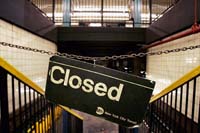
Subways and buses ground to a halt yesterday morning as transit workers walked off the job at the height of the holiday shopping and tourist season, forcing millions of riders to find new ways to get around.
Mayor Michael Bloomberg, who had said the strike would cost the city as much as US$400 million a day, joined the throngs of people crossing the Brooklyn Bridge in the freezing cold as he walked from a Brooklyn emergency headquarters to City Hall. Other New Yorkers car-pooled or rode bicycles.
"I think they all should get fired," said Eddie Goncalves, a doorman trying to get home after his overnight shift. He said he expected to spend an extra US$30 per day in cab and train fares.
It is New York's first citywide transit walkout since an 11-day strike in 1980, and officials said they would seek quick court action, which could include stiff fines. Pay rises and pension and health benefits for new employees are main sticking points.
Authorities began locking turnstiles and shuttering subway entrances shortly after the Transport Workers Union ordered the strike. The buses and subways, the nation's largest transit system, serve 7 million riders a day.
At one subway booth, a handwritten sign read, "Strike in Effect. Station Closed. Happy Holidays!!!"
Huge lines formed at ticket booths for the commuter railroads that stayed in operation, and Manhattan-bound traffic backed up at many bridges and tunnels as police turned away cars with fewer than four people. All the while, transit workers took to the picket lines with signs that read "We Move NY. Respect Us!"
Commuters, scrounging for ways to get to work, lined up for cabs and gathered in clusters on designated spots throughout the city for company vans and buses to shuttle them to their offices.
"There were hundreds of people waiting for cabs, pulling doors left and right," said taxi driver Angel Aponte, who left his meter off and charged US$10 per person.
Bloomberg has said the strike would be particularly harsh during the holidays, predicting it would freeze traffic into "gridlock that will tie the record for all gridlocks."
The union called the strike after a late round of negotiations broke down on Monday night. Union President Roger Toussaint said the union board voted overwhelmingly to call the strike.
(China Daily December 21, 2005)
|

